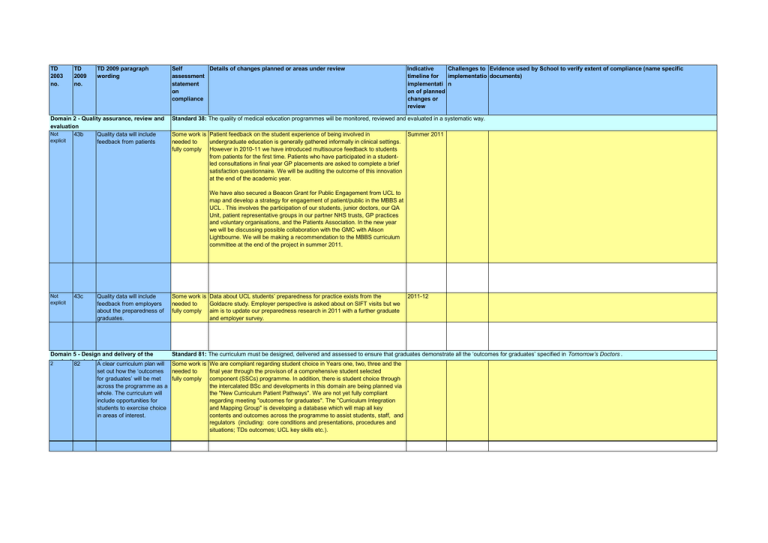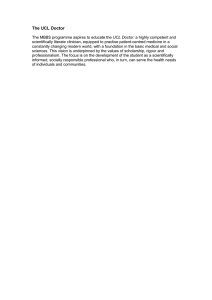TD TD 2009 paragraph Self Details of changes planned or areas under review
advertisement

TD 2003 no. TD 2009 no. TD 2009 paragraph wording Domain 2 - Quality assurance, review and evaluation Not 43b Quality data will include explicit feedback from patients Self Details of changes planned or areas under review assessment statement on compliance Indicative Challenges to Evidence used by School to verify extent of compliance (name specific timeline for implementatio documents) implementati n on of planned changes or review Standard 38: The quality of medical education programmes will be monitored, reviewed and evaluated in a systematic way. Some work is Patient feedback on the student experience of being involved in Summer 2011 needed to undergraduate education is generally gathered informally in clinical settings. fully comply However in 2010-11 we have introduced multisource feedback to students from patients for the first time. Patients who have participated in a studentled consultations in final year GP placements are asked to complete a brief satisfaction questionnaire. We will be auditing the outcome of this innovation at the end of the academic year. We have also secured a Beacon Grant for Public Engagement from UCL to map and develop a strategy for engagement of patient/public in the MBBS at UCL . This involves the participation of our students, junior doctors, our QA Unit, patient representative groups in our partner NHS trusts, GP practices and voluntary organisations, and the Patients Association. In the new year we will be discussing possible collaboration with the GMC with Alison Lightbourne. We will be making a recommendation to the MBBS curriculum committee at the end of the project in summer 2011. Not explicit 43c Quality data will include feedback from employers about the preparedness of graduates. Domain 5 - Design and delivery of the curriculum, assessment 2 82 including A clear curriculum plan will Some work is Data about UCL students’ preparedness for practice exists from the needed to Goldacre study. Employer perspective is asked about on SIFT visits but we fully comply aim is to update our preparedness research in 2011 with a further graduate and employer survey. 2011-12 Standard 81: The curriculum must be designed, delivered and assessed to ensure that graduates demonstrate all the ‘outcomes for graduates’ specified in Tomorrow’s Doctors . Some work is set out how the ‘outcomes needed to for graduates’ will be met fully comply across the programme as a whole. The curriculum will include opportunities for students to exercise choice in areas of interest. We are compliant regarding student choice in Years one, two, three and the final year through the provison of a comprehensive student selected component (SSCs) programme. In addition, there is student choice through the intercalated BSc and developments in this domain are being planned via the "New Curriculum Patient Pathways". We are not yet fully compliant regarding meeting "outcomes for graduates". The "Curriculum Integration and Mapping Group" is developing a database which will map all key contents and outcomes across the programme to assist students, staff, and regulators (including: core conditions and presentations, procedures and situations; TDs outcomes; UCL key skills etc.). 48 83 The curriculum will be structured to provide a balance of learning opportunities and to integrate the learning of basic and clinical sciences, enabling students to link theory and practice. Some work is "Patient Pathways" and "Extended Patient Projects" will be introduced in the needed to new curriculum to years one, two and three. fully comply Considerable recent work has been undertaken through a new "Curriculum Integration and Mapping Group". In addition, there are plans to introduce more vertical elements running through all years and the iBSc will be integrated into the programme as a whole - making direct links between the science studied and clinical practice. A revised "Foundation Module" will be introduced in 2011-12, this will focus on making the link between theory and practice more explicit from the first week of year 1. We are now on target to be fully compliant by 2012-13 Starting 2011, Resource, both http://www.ucl.ac.uk/medicalschool/staffstudents/mbbs-review/ with full human and implementatio financial n 2013 Domain 6 - Support and development of students, teachers and the local faculty 45 128 Standard 122: Students must receive both academic and general guidance and support, including when they are not progressing well or otherwise causing concern. Everyone teaching or supporting students must themselves be supported, trained and appraised. Everyone involved in Some work is educating medical students needed to will be appropriately fully comply selected, trained, supported and appraised. Domain 8 - Educational resources and capacity Not 162 There will be enough staff explicit from appropriate disciplines, and with the necessary skills and experience, to deliver teaching and support students’ learning. COMPLIANT FOR: Professional Development Spine (PDS) tutors, GP tutors, university appointed staff and some NHS staff. Because of the nature of the NHS as a learning environment we are not able to fully guarantee that all those engaged in undergraduate medical education will be fully compliant with all the criteria listed. All PDS tutors are recruited via competitive application and interview. They undergo an induction with other new PDS tutors (2 sessions) where they are oriented to the MBBS course, the PDS course and the teaching and learning style. They also have training in being a personal tutor. They attend a further training session with existing tutors and are given a buddy as a mentor for the first year. In their first year they also have a peer observation of teaching and attend 2 further training sessions. Once established they attend 3 training sessions a year and are peer observed every two years. GP tutors are selected, trained for their educational role and ongoing support is offered at regular meetings and educational events. University appointed staff are appraised ideally annually, but no less frequently than every two years. At appraisal training requirements are reviewed and training courses may be organised if and when required. Probationary Lecturers who have little or no experience of teaching in higher education prior to joining UCL are expected to register for the Postgraduate Certificate in Learning and Teaching in Higher Education (PGCLTHE) which is taught by the UCL Centre for the Advancement of Learning and Teaching (CALT). This PG Certificate course consists of two 30-credit MA Education modules. One of the probationary requirements at UCL is the completion of the core module (30credits) entitled “Exploring Learning in Higher Education”. All lecturing staff have one of their teaching session peer reviewed on an annual basis and receive feedback which they can use to develop their teaching skills. Standard 159: The educational facilities and infrastructure must be appropriate to deliver the curriculum. Some work is Identify, recruit and train appropriate staff needed to fully comply Local service reconfigurations may alter the landscape of educational providers but there are a sufficient range of disciplines in the Medical School. The new curriculum is taking this into account. There needs to be some further work on engagement of teachers, developing them as educators and maintaining high standards. The new curriculum for Years 4 and 5 will be piloted over 2011-12 and launched in 2012-13. Reviewing this aspect will form part of the appraisal of the new curriculum. Resource, both http://www.ucl.ac.uk/medicalschool/staffstudents/mbbs-review/ human and financial Coincidental DH proposals on Developing the Healthcare Workforce just launched for consultation. Domain 9 - Outcomes Not explicit 172 Quality management will involve the collection and use of information about the progression of students. It will also involve the collection and use of information about the subsequent progression of graduates in relation to the Foundation Programme and postgraduate training, and in respect of any determinations by the GMC. Standard 168: The outcomes for graduates of undergraduate medical education in the UK are set out in this document. All medical students will demonstrate these outcomes before graduating from medical school. Standard 169: The medical schools must track the impact of the outcomes for graduates and the standards for delivery as set out in Tomorrow’s Doctors against the knowledge, skills and behaviour of students and graduates. Some work is There is a plan to review the types of assessments carried out during student Oct-11 Choice of Comparison of data collected from assessment with outcome of FY1 needed to fully comply assistantships. The aim of this will be to identify whether or not there are particular areas of medical practice, essential for the Foundation Programme, that could be developed in the MBBS. We have increased contact between the final year team and our local Foundation School with regular discussion regarding priorities. Ann Griffin, Sub Dean for QA is discussing a systematic "exit" survey with the FS adminstrator for all our graduates at the end of their foundation year. One of our partner Trusts (Basildon) recruits over 80% of it foundation doctors from UCL, is undertaking a two year comparison survey focusing on any changes in "perceived preparedness" resulting from the introduction of the new final year curriculum in 2010-11. The dispersal of our graduates remains a major challenge to the systematic gathering of data. assessment

